What we know
- Israeli forces in heavy disguise raided a hospital in the occupied West Bank this morning, killing three militants who the IDF said were using the hospital as a base to plan terrorist attacks. Hamas and the Palestinian Islamic Jihad militant group claimed the trio as members. The Palestinian Health Ministry said the soldiers opened fire inside hospital wards.
- Hamas said it was reviewing a proposed hostage deal after a source familiar with the talks told NBC News that Israeli, Qatari, Egyptian and U.S. officials in Paris had reached a “unified position” on a framework involving a 60-day pause of hostilities in Gaza.
- President Joe Biden said he has made a decision about the U.S. response to the attack that killed three service members in Jordan, though he did not offer any further detail. The response could be multilevel and come in stages, according to Secretary of State Antony Blinken. One theory about the strike suggests that the drone was able to evade air defenses because it flew in as a U.S. drone was also entering.
- More than 26,700 people have been killed in Gaza since the war began, according to the Palestinian Health Ministry. More than 65,000 have been injured, and thousands more are missing and presumed dead.
- Israeli military officials said at least 220 soldiers have been killed during the ground invasion of Gaza. About 1,200 people were killed and about 240 hostages were taken after Hamas' multipronged attacks on Oct. 7.
- NBC News’ Keir Simmons, Hala Gorani, Raf Sanchez, Matt Bradley and Chantal Da Silva are reporting from the region.
'No human brain can process this': Photojournalist Motaz Azaiza on life after leaving Gaza
Gazan photojournalist Motaz Azaiza opened up about life in the Palestinian enclave after more than 100 days of covering the war and the fear that he may never be able to return home.
Azaiza, who has more than 18 million Instagram followers, announced this month that he was leaving Gaza for refuge in Doha, Qatar — which he described as a difficult decision in an interview today on Al Jazeera's "The Stream." He said that during his coverage of the war, he'd get anonymous calls that made him fearful for his life.
"I spent like more than a month of the war sleeping on the streets to not go to home, even to, to eat, to shower see my family. ... I was worried if maybe if I enter the house they will bomb the house because I was the one causing noise," Azaiza said.
But he vowed to continue making noise after leaving Gaza and keep speaking about what was happening, even as he fears he may never be able to return home.
Azaiza said it is almost worse outside Gaza, as even having clean drinking water inspires guilt.
He said he has lost friends and relatives in the last four months, sometimes even forgetting those who were killed early on in the war. Asked whether any of the images he photographed stick with him, Azaiza said "the most terrifying pictures" were ones he never took.
"No human brain can process this," he said.
Israeli minister who pushed idea of resettling Gaza threatens to quit government over any ‘reckless’ deal
JERUSALEM — A far-right partner in Netanyahu’s coalition threatened to quit the government over any attempt to enter a “reckless” deal with Hamas to retrieve hostages held by the Palestinian militants.
“Reckless deal = dismantling of the government,” Itamar Ben-Gvir of the Jewish Power party posted on X amid media reports that Israel was considering a long-term pause, brokered by Qatar and Egypt, in its offensive against Hamas in the Gaza Strip.
Netanyahu has stressed his commitment to destroying Hamas, whose Oct. 7 cross-border killing and kidnapping spree blindsided Israel, and he argues that the military pressure improves the chances of recovering the 132 hostages.
But at least one member of Netanyahu’s decision-making war Cabinet — former military chief Gadi Eisenkot, whose son and nephew died fighting in Gaza — has cast doubt on the prospects for rescue missions and called for a hostage deal.
That has set off speculation that Netanyahu is under pressure from both his left- and right-wing flanks, spelling a potentially wider shakeup — and perhaps even a snap election.
Jewish Power accounts for six of the 64 seats Netanyahu’s religious-rightist coalition held in the 120-seat parliament before the Gaza war. He has since brought Eisenkot’s 12-seat centrist National Unity party into an emergency Cabinet.
Ben-Gvir and another ultranationalist coalition partner, Finance Minister Bezalel Smotrich of the Religious Zionism party, have chafed at their exclusion from the war Cabinet. They have called for no let-up in the offensive and for Israel to resettle Gaza, from which it withdrew in 2005. Netanyahu has ruled out rebuilding Jewish settlements there but says post-war Gaza will be under Israeli security control.
Israeli lawmaker faces possible expulsion over support of South Africa's genocide case
JERUSALEM — An Israeli parliamentary committee has recommended expelling a lawmaker for supporting the South African genocide case against Israel in the U.N. world court.
The Knesset’s House Committee today passed the measure to expel lawmaker Ofer Cassif on a 14-2 vote. The proposal now goes to the full 120-member parliament. Approval would require a 90-vote supermajority.
Cassif is the lone Jewish member of a small predominantly Arab party in parliament called the Joint List.
After today's vote, Cassif said claims that he supports Hamas are a “blatant lie.”
He called himself a victim of “political persecution and silencing.”
In response to South Africa’s case, the International Court of Justice last week called on Israel to take steps to prevent a genocide against Palestinians in the Gaza Strip. It rejected an appeal to order an immediate cease-fire.
Israeli leaders have rejected the accusations, saying the war in Gaza is against Hamas, not the broader civilian populations.
$300,000 allocation from 2023 budget to UNRWA suspended, State Department says
The U.S. will initially suspend $300,000 in funds from the United Nations Relief and Works Agency for Palestine Refugees, the State Department said today, in the wake of allegations linking 12 UNRWA employees to the Oct. 7 Hamas attack on Israel.
This is the first time the State Department has quantified the U.S. aid that will be affected by the administration's decision to pause financial support. UNRWA is the leading provider of humanitarian aid in Gaza.
The Biden administration has not said when the U.S. will resume funding. State Department spokesperson Matt Miller said it will depend on the investigation into the matter and "whatever remedial steps" UNRWA takes.
"We’ve seen the initial steps to accountability and that UNRWA has fired eight of the employees and suspended two others while they conduct the investigation," Miller said. "We are engaging with UNRWA, we are engaging with the United Nations about what those steps ought to look like.”
Miller added that UNRWA's work is critical and that is why the U.N. must take the matter seriously.
The suspended $300,000 in U.S. funds is the last of those already allocated to UNRWA since the start of the fiscal year in October 2023, but hundreds of millions more could potentially be impacted when Congress passes a broader budget.
While the U.S. is operating on a continuing resolution and has provided $121 million to UNRWA so far, as the top government donor to the U.N. agency, the U.S. typically provides somewhere from $300 million to $400 million a year in funding.
NBC News’ Hala Gorani travels with critically ill Gaza refugees aboard a flight from Egypt to the United Arab Emirates, where they will receive treatment.
Path forward on UNRWA funding fuels global debate
As questions loom over allegations that a dozen staffers of the United Nations Relief and Works Agency for Palestine Refugees were involved in the Oct. 7 attack on Israel, the topic of funding the agency and its future has come to the foreground.
The U.S., U.K., Canada and other countries have suspended funding to the agency as UNRWA warns it will run out of money by the end of February. Linda Thomas-Greenfield, the American ambassador to the U.N., did not say when funding might resume. "We need to see fundamental changes before we can resume providing funding directly to UNRWA," she said.
"We need to look at the organization, how it operates in Gaza, how they manage their staff, and to ensure that people who commit criminal acts, such as these 12 individuals, are held accountable immediately so that UNRWA can continue the essential work that it is doing," Thomas-Greenfield said.
U.S. Sen. Bernie Sanders, I-Vt., released a statement urging the U.S. to reconsider its suspension of funding while saying the allegations against the 12 staff members were unacceptable.
“However, we cannot allow millions to suffer because of the actions of 12 people,” Sanders said.
Eylon Levy, a spokesperson for the Israeli prime minister’s office, accused UNRWA of being a front for Hamas and of covering up the group’s crimes. UNRWA Commissioner-General Philippe Lazzarini has described this as the actions of a small group, noting that it submits a list of hired staff to Israel every year and has not heard specific concerns on staff before this.
The United Nations' leadership said that it has terminated nine of those involved, confirmed that one is dead and said that the organization was working to confirm the identity of two others. An investigation was also immediately launched into the matter.
A group of aid agencies including Oxfam and Save the Children issued a joint statement yesterday urging countries to resume funding to UNRWA, saying the suspension would have serious consequences to the more than 2 million Gazans dependent on UNRWA for survival as civilians are cut off from basic necessities. The agencies encouraged the investigation but also noted that the cut in funding comes after the International Court of Justice ordered Israel to act to ensure humanitarian assistance to civilians.
"We are shocked by the reckless decision to cut a lifeline for an entire population by some of the very countries that had called for aid in Gaza to be stepped up and for humanitarians to be protected while doing their job," the statement said.
'UNRWA is a failure': U.N. agency under microscope at House hearing
The House Foreign Affairs Committee's hearing examining UNRWA's mission and operations is under way in Washington.
Three witnesses criticized the agency and said the agency supports terrorism, while a fourth argued the agency is crucial to a population in need.
UNRWA "indoctrinates generation after generation to hate Jews and Israel and prepare for genocide," Richard Goldberg, a senior advisor at the Foundation for Defense of Democracies, said in his opening testimony. "Terror finance is a feature, not a bug,” Goldberg added that UNHCR or the World Food Program would be better suited to support the Palestinian people.
Marcus Sheff, CEO of the international NGO IMPACT-se research and policy institute, which has examined UNRWA's education system for more than two decades, said textbooks taught in UNRWA schools glorify the killing of Jews.
He cited an example from a textbook that referred to a Palestinian firebombing attack on a Jewish bus near the West Bank city of Ramallah as a “barbecue party.”
UNRWA responded to the House Foreign Affairs Committee inquiry with a January 15 letter from UNRWA’s Washington Representative Office Director William Deere that specifically addressed the allegations about the UNRWA education system.
“UNRWA devotes considerable time and resources to ensuring its teaching reflects U.N. values,” Deere wrote. “The U.N., in any refugee situation across the world, utilizes host country curriculums. This practice is aimed at ensuring students can matriculate into host country educational systems at any level and more broadly participate in the social and economic life of the host country.”
A spokesperson for UNRWA declined to comment beyond the letter.
Mara Rudman, Schlesinger professor at the University of Virginia Miller Center, testified during the House hearing that although UNRWA is not without problems, there is no other organization that could serve as a substitute for it at this time.
Waves of Gazans seen fleeing parts of Khan Younis
Large crowds of displaced Gazans were seen yesterday fleeing on foot sections of the southern Gaza city of Khan Younis and crossing through an Israeli military checkpoint.
In a series of interviews an NBC News team on the ground conducted with displaced residents along the route, Palestinians said they were heeding Israeli evacuation flyers that instructed them to leave the city's Al Mawasi neighborhood because of the intensity of hostilities there.
NBC News' footage showed a group of several hundred — if not more — young children, elderly people, men and women, many of whom carried their belongings in garbage bags and held sleeping bags over their heads. One older woman was transported in a hospital bed that had been strapped onto a donkey cart.
Locals described being "humiliated" by Israeli troops who they said were patrolling the evacuation route, which was lined with tanks.
Rima Al-Najar, a displaced woman who had been sheltering in a school, described gunfire and violence while fleeing the area.
“We were told to leave Khan Younis, there were tanks all the way, and it was crowded with young men and older people. The Jewish army called on young men to take off their clothes, and search them,” she said.
“The young men were running, the Israeli army opened fire, then a helicopter opened fire as well, and there were two injuries. The children were terrified, all the people were tense,” Al-Najar added.
The IDF did not immediately respond to a request for comment about the residents' accounts.
Um Akram, a displaced mother who had also been staying in a school, told NBC News that she struggled to walk such long distances because of her weak knees.
Once she reached the checkpoint, she said, "they hardly let us cross.”
Biden discussed U.S. response to Jordan attack with his team before saying he'd made a decision
Before departing the White House this morning, President Joe Biden had discussions with members of his national security team regarding the U.S. response to the drone attack that killed three American troops in Jordan, according to a U.S. official.
The president later told reporters that he had made a decision about how to respond to the attack. The official said the president’s decision took shape over the course of his discussions with advisers in the three days since the attack. However, no details have been released about what the president's decision is or what exactly the U.S. response will entail.
During a Situation Room meeting yesterday, Biden and his advisers analyzed and deliberated over response options, the official said.
Palestine Red Crescent Society says headquarters still surrounded by violence
Fighting continues around Al-Amal Hospital and the headquarters of the Palestine Red Crescent Society in Khan Younis.
At least one displaced woman was killed and nine injured by shrapnel, the PRCS said in a post today on X. The organization posted a video clip of what appeared to be a gymnasium on its grounds, with audible shelling outside. Blankets and sheets had been hung inside to create makeshift rooms for displaced people.
According to the organization, some of the violence has reached the headquarters' front yard area and sparked fires in tents within the confines of its grounds.
"We deeply worry for the safety of our teams, the wounded, the sick, and thousands of displaced people in the building," the PRCS said in another post.
NBC News has not independently verified the details of the PRCS updates. The IDF said in a statement that it did not operated inside of Al-Amal Hospital or request its evacuation.
The IDF said last week that it had received information that militants were operating in and around Al-Amal Hospital, which is run by the PRCS, and the nearby Nasser Hospital.
Pakistan and Iran agree to move on from missile strikes
Pakistan and Iran said they respected each other’s sovereignty and territorial integrity and would expand security cooperation, bidding to mend ties after tit-for-tat missile strikes at what they said were militant targets.
Foreign ministers of the two countries held talks in the Pakistani capital days after their military moves earlier in January raised concerns about wider instability in the region since the war between Israel and Hamas erupted on Oct. 7.
Pakistan’s caretaker Foreign Minister Jalil Abbas Jilani, speaking at a joint news conference yesterday with his Iranian counterpart, Hossein Amir Abdollahian, said the neighbors had several strong channels of communication with each other.
“All these channels were operational and we were able to bring whatever issue or misunderstanding that had been created between our two countries, we were able to resolve it fairly quickly,” he said.
IDF describes new technique to flood Hamas tunnels
In a statement today, the IDF described new techniques it has developed to fill up Hamas' underground tunnels with large volumes of water.
The Israeli military has attempted to flood the tunnels with seawater before, in an effort to render Hamas' underground stockpiles of weapons inoperable and eliminate hiding spots for militants. But the Palestinian Water Authority warned that such actions could damage Gaza’s underground aquifers. Others also feared that it could destabilize the ground or damage soil for crops, further exacerbating the humanitarian crisis.
According to the IDF, its new approach does not harm Gaza’s groundwater as it relies on the installation of pumps and pipes, which pump the water into tunnel routes that have been deemed suitable.
"The capability was developed in a professional capacity, including analysis of the soil characteristics and the water systems in the area to ensure that damage is not done to the area’s groundwater," the statement said.
41% of Gaza Strip land affected by evacuation orders since December, U.N. says
Since Dec. 1, evacuation orders issued by the Israeli military have been implemented across 61 square miles of land in the Gaza Strip, the United Nations Office for the Coordination of Humanitarian Affairs said in an update yesterday.
That amounts to 41% of the enclave's territory, an area that contained nearly 1.4 million Palestinians before Hamas' Oct. 7 attacks.
New evacuation orders issued yesterday pertained to particular neighborhoods of western Gaza City — a total area of more than 12 square kilometers, the U.N. office said.
Biden says he's made a decision on U.S. response to troop deaths
While speaking to reporters on the South Lawn of the White House today, President Joe Biden was asked whether he had decided on a response to the drone strike that killed three American soldiers at a base in Jordan.
"Yes," Biden said simply, offering no additional detail.
He added that he held Iran responsible for the attack because it supplied weapons "to the people who did it."
UNRWA rep in Gaza says funding cuts 'will be a catastrophe'
Adnan Hasna, a spokesperson for the United Nations Relief and Works Agency in Gaza, criticized the pauses in funding for the agency that nearly a dozen donor countries have imposed, following allegations that a dozen UNRWA staff members participated in the Oct. 7 attacks.
The U.S., U.K. and Canada are among those that have suspended funding to the U.N. agency responsible for Palestinian refugees, pending an investigation.
"It is a very dangerous action," Hasna told an NBC News team in Gaza last night.
"It will be a catastrophe for the whole population of Palestine refugees, not only in Gaza but also in the five fields of operation," he added, referring to Palestinian refugees living in Jordan, Syria, Lebanon and the occupied West Bank — all of whom are eligible for humanitarian relief from the UNRWA.
Hasna said the agency "is an actor of peace and stability" in the region.
He confirmed that his agency has been in touch with Israeli authorities about the allegations. Of the 12 staff members accused of involvement on Oct. 7, eight have already been fired. He said agency leaders are still "searching" for two people, and it is unclear "if they are still staff or they are retired."
Hasna said that given the threat of diminished funding, he is most concerned about the UNRWA's ability to deliver lifesaving services in Gaza.
"We are providing services for everyone in Gaza, not only Palestine refugees — for the whole population," he said, adding that the agency's operation could "unravel if there will be no renewing to the fund until the end of February."
Hostage deal framework discussed by Israeli war Cabinet but no vote yet, source says
TEL AVIV — The framework of a potential new hostage deal, which was hammered out in Paris, was discussed by the Israeli war Cabinet yesterday, a senior Israeli official told NBC News today. But it has not yet been put to a vote.
The last deal was approved first by the Israeli war Cabinet, then by the larger security Cabinet, and finally by the full government.
The official said they expect any future deal to go through the same process, but that the Paris proposal is not yet ready to be voted on — partly because it’s unclear if Hamas will demand changes.
The official noted that a major sticking point remains the duration of a pause in fighting: Israel has said it would only be temporary, Hamas has demanded a permanent cease-fire.
“If there’s going to be a deal, there will have to be a meeting of minds,” the official said. “We won’t agree to an end to the hostilities. It’s clear from our perspective it has to be a time out in the fighting.”
Asked about opposition to the emerging deal from far-right ministers within Benjamin Netanyahu’s Cabinet, the official said he was confident the prime minister could steer it through: “I think if there’s a deal the prime minister can live with, it can get a majority in all the necessary forums.”
Battle intensifying around Gaza's main hospital, WHO warns
Fighting surrounding the Nasser Hospital — the main medical complex still in operation in Gaza — is getting worse, the World Health Organization warned.
The embattled hospital, located in the southern city of Khan Younis, is at risk of collapse if it cannot receive extra supplies, the WHO said.
"The situation around Nasser has only gotten worse — the shooting, fighting around, the difficulty of access for people to reach Nasser or the difficulty for leaving," WHO spokesperson Christian Lindmeier said in a briefing at its Geneva headquarters, according to a Reuters report.
In addition to treating patients, hospitals in Gaza have been sheltering thousands of displaced people.
Netanyahu: No compromise, no prisoner swap, no withdrawal
A combative Benjamin Netanyahu said that he will "not release thousands of terrorists" or take Israeli forces out of Gaza, following reports that a framework for a potential new deal had been presented to Hamas.
That proposal included the possibility of a 60-day pause in hostilities and the release of civilian hostages in exchange for Palestinian prisoners, a source familiar with the talks told NBC News. In a press statement, Hamas confirmed it was looking at the plan.
However, speaking at the Bnei David pre-military academy in the occupied West Bank, Netanyahu said he remained committed to the "war goals" of eradicating Hamas and freeing Israeli hostages.
"I hear talk about all kinds of deals. I would like to make it clear: We will not conclude this war without achieving all of its goals. This means eliminating Hamas, returning all of our hostages and ensuring that Gaza never again constitutes a threat to Israel," he said.
Funerals held for militants killed in Israeli hospital raid
Mourners carry the bodies of the two Ghazawi brothers, who were among three Palestinian militants killed when undercover Israeli forces raided the Ibn Sina Hospital in the city of Jenin, in the occupied West Bank, today.
The IDF said the three men belonged to a Hamas "terrorist cell," and that the raid thwarted an imminent attack.
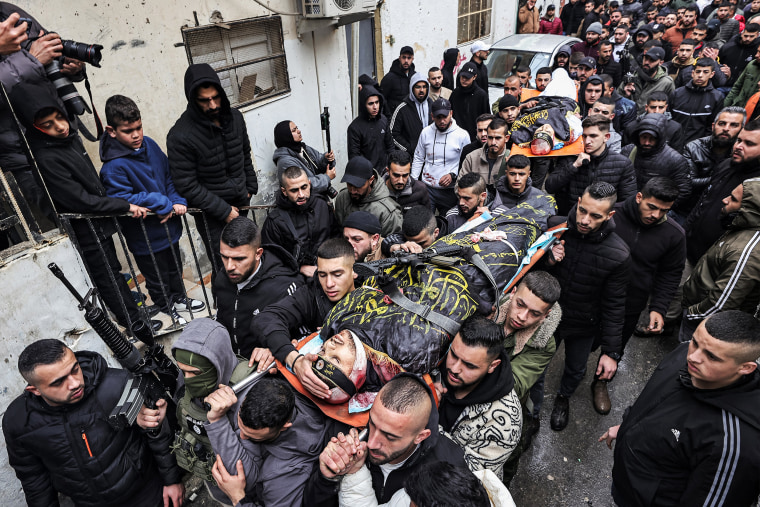
Analysis: No easy options for Biden as he weighs response to deadly drone attack
ERBIL, Iraq — There are no easy options for President Biden.
The U.S. has launched multiple airstrikes against Iranian-backed militia in Iraq, Syria and Yemen since October, but those strikes don’t seem to have worked as deterrence.
Now, Blinken is talking of a “multileveled” and “sustained” response that could come in stages.
But local reports here in northern Iraq say Iranian-backed militia are evacuating installations along the country’s border with Syria in anticipation of a U.S. response, while continuing to launch attacks.
The question the Biden administration is weighing now: Is it possible to escalate against Iran in order to de-escalate the broader situation, and avoid slipping into direct war?
China warns against ‘vicious cycle of retaliation’ after three U.S. soldiers killed
HONG KONG — China has warned against a “vicious cycle of retaliation” after three U.S. troops were killed in a drone attack in Jordan.
China “has taken note of the reports of casualties resulting from the attack on the U.S. military base, as well as Iran’s statement that it had nothing to do with the attack,” Foreign Ministry spokesperson Wang Wenbin told reporters in a daily press briefing this morning.
In light of what he said was the complicated and sensitive situation in the Middle East, he added that China called on all parties concerned to exercise “calm and restraint” to “avoid being caught in a vicious cycle of retaliation and prevent further escalation of tension in the region.”
U.N. chief to meet with key aid donors as more countries suspend funding
U.N. Secretary-General António Guterres will meet with key donors to the U.N. humanitarian agency for Palestinian refugees today as fears grow for Gaza aid funding.
Several countries, including the U.S. and the U.K., announced the suspension of funding to UNRWA — which has been crucial support for Gazans — after allegations that some staff members were involved in the Hamas attacks in Israel on Oct. 7.
Guterres is “personally horrified” by these allegations, his spokesperson said in a statement yesterday, but the chief called on countries to “at least guarantee the continuity of UNRWA’s operations, as we have tens of thousands of dedicated staff working throughout the region.”
“The dire needs of the desperate populations they serve must be met,” the spokesperson added.
Hamas is 'studying' new hostage deal proposal for Gaza cease-fire, leader Haniyeh says he will travel to Cairo to discuss it
Ismail Haniyeh, Hamas' Qatar-based political leader, said he will travel to Cairo to discuss a cease-fire proposal that was formulated in Paris over the weekend.
In a press statement posted on the group's Telegram channel, Hamas confirmed it was looking at the plan and that "it is in the process of studying it and submitting its response to it on the basis that the priority is to stop the aggression and the brutal attack on Gaza and the complete withdrawal of the occupation forces from the Strip."
The statement added that “the movement is open to discussing any serious and practical initiatives or ideas, provided that they lead to a comprehensive cessation of aggression.”
Israeli, Qatari, Egyptian and American officials in Paris reached a “unified position” on a framework for a hostage deal that would involve a 60-day pause of hostilities in Gaza, a source familiar with the talks told NBC News.
Cold temperatures, heaps of waste plague displaced Palestinians in southern Gaza
Stray cats pick through piles of discarded waste, heavy rainfall seeps through nylon tents and Gazans transport their mattresses and belongings on their back as they flee for relative safety farther south.
An NBC News team on the ground filmed the scenes and dire conditions unfolding for displaced Palestinians taking shelter in the Nasser Hospital medical complex in Khan Younis over the weekend.
Imra Fija Bitarrabish, a concerned mother, showed NBC News around her tent, which she said sustained rips through the nylon fabric and allowed rain to fall through, worsening the already basic conditions she and her two children are weathering in the makeshift tent campsite.
“A little while ago a bomb fell behind us,” Bitarrabish told NBC News. “I went to the people responsible for Gaza over there, I told them a bomb fell, and the nylon ripped. I can be hurt because of all the water falling on me but no one believed me. I begged for nylon.”
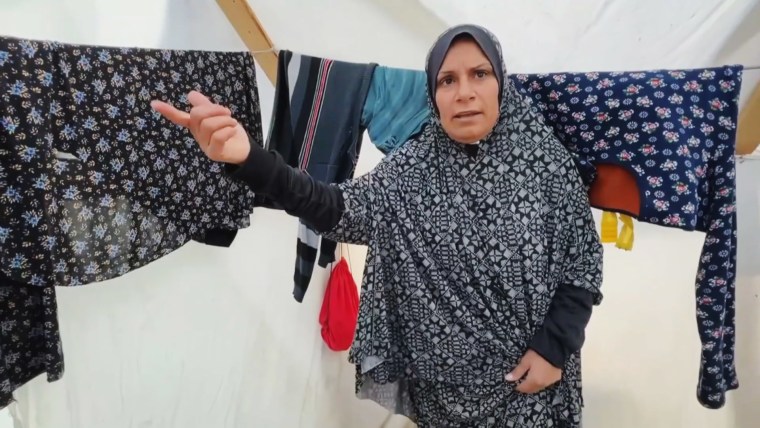
She showed the water seeping through the base of her tent, that has nothing but a foam mattress, a bucket and some clothes hanging on a line.
Harsher weather conditions have made the already dire conditions worse for those in Gaza.
“We’re sleeping in the freezing cold,” Imra’s young son said.
And with the Israeli bombardment on the enclave continuing, the Palestinian mother is scared.
“This is a piece which came from the neighboring tents,” Bitarrabish said, showing a piece of a metal fragment. “Feel its weight, it can kill or hurt a person. It fell on a tent. Not on a house, not on walls, it fell on nylon. We’re in danger of death.”
Bombardments continue in southern Gaza
A smoke plume erupts after an Israeli bombardment over Rafah in the southern Gaza Strip this morning.
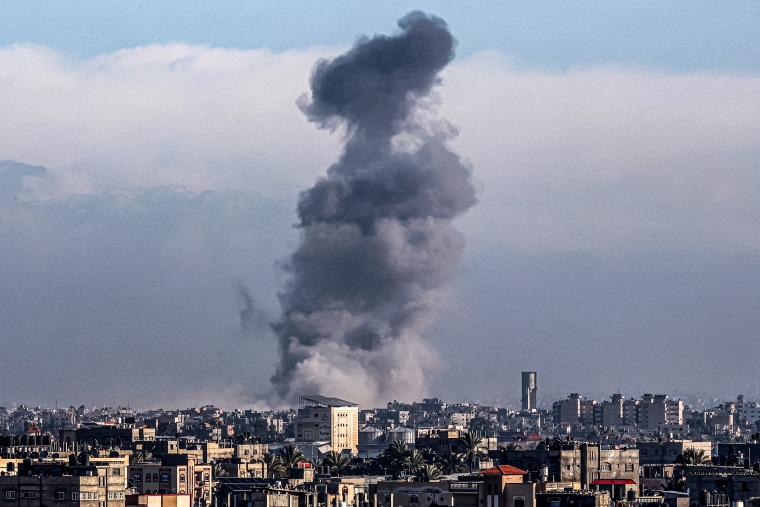
Video shows undercover Israeli forces raiding hospital dressed as medics and civilians
TEL AVIV — Surveillance video appears to show the dramatic undercover raid by Israeli forces this morning inside a hospital in the occupied West Bank.
In the footage, which circulated widely online, a number of people armed with rifles can be seen sweeping through the third floor of the Ibn Sina Hospital in Jenin disguised as patients, medical staff and women. One person wears what appears to be a doctor’s lab coat. Another wears nurse’s scrubs. A third carries a wheelchair, while a fourth appears to juggle a rifle in one hand with a baby carrier in another. Others are simply dressed in plain clothing, including Muslim headscarves.
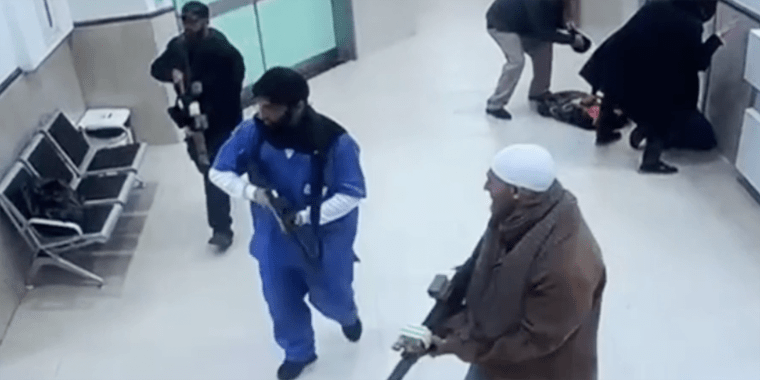
Abeer Zeid Al-Kelani, a public relations officer at the Ibn Sina Hospital, told NBC News that the raid was unprecedented at the facility. “This is the first time that occupation soldiers entered the hospital in disguise,” she said.
She said that Basel Ghawazi, who she said was 18, was a patient at the hospital. She said he had been receiving physical therapy after being “injured by an army officer.” She said his brother, Mohammed Ghazawi, 23, had been in his room with him, along with Mohammed Jalamneh, 27, when the three men were killed in the raid, which she said happened in the early hours.
The IDF said three Palestinian militants had been killed while hiding out at the hospital.
NBC News geolocated the video to a reception area of the Ibn Sina Hospital by comparing it against Facebook photos of the hospital in 2021. The date and time stamp matched the date the IDF said the operation took place, and the date and time of day given by the Palestinian Health Authority and Hamas in their statements.
Surveillance video captured the moment Israeli forces stormed a hospital in the occupied West Bank in disguise to kill three militants.
Blood spatters and bullet holes in aftermath of IDF hospital raid
A bullet hole in a pillow of a hospital bed covered in blood at the Ibn Sina Hospital in Jenin, in the occupied West Bank today.
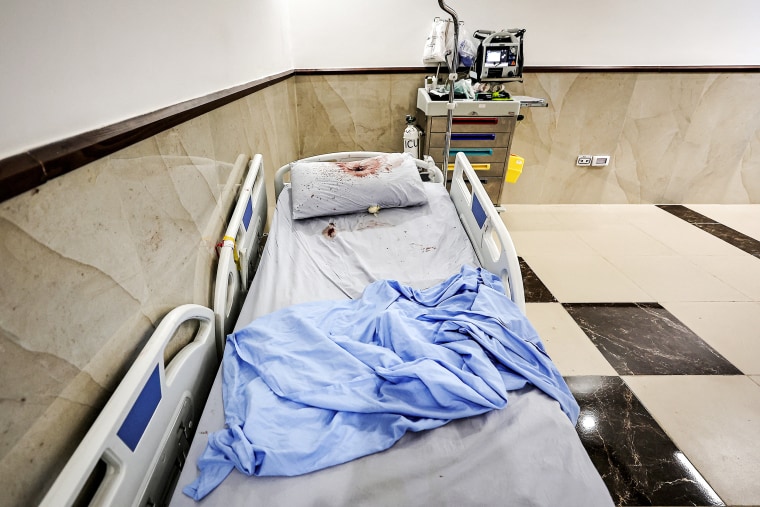
Israeli forces shot dead three Palestinians at the hospital in the early hours of this morning, the Palestinian Health Ministry said, while the IDF said the three belonged to a Hamas “terrorist cell.”
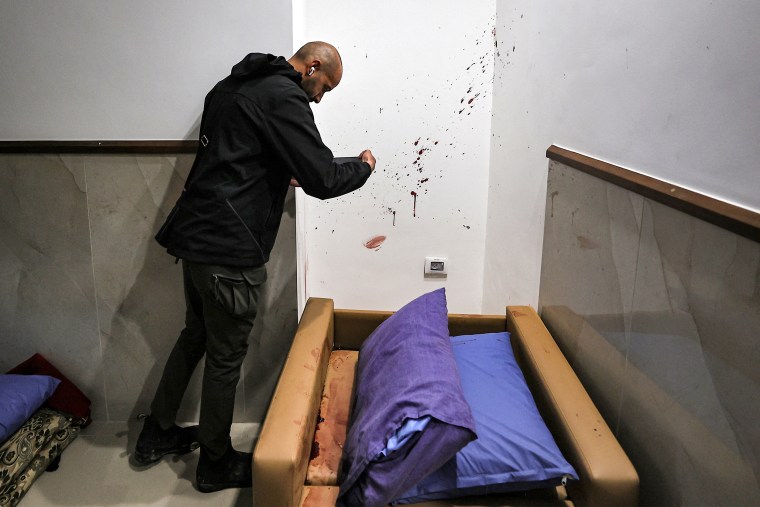
Israeli forces kill 3 militants in raid on West Bank hospital
TEL AVIV — The Israeli military said it killed three Palestinian militants in a raid on a hospital where they were hiding out in the occupied West Bank.
The Israel Defense Forces said the three men, operating as a “Hamas terrorist cell,” were killed in a joint operation with the Israel Securities Authority and Israel Police this morning at the Ibn Sina hospital in the northern city of Jenin.
The IDF identified the three people killed as Mohammed Jalamneh, 27, Mohammed Ghazawi and his brother Basel Ghawazi. It did not provide the ages of the two brothers. Jalamneh, it said, was a Hamas member who had “recently been involved in promoting significant terrorist activity” and was planning to carry out an imminent attack. It said Mohammed Ghazawi had been involved in “numerous attacks,” including firing at IDF soldiers in the area, while Basel Ghawazi was accused of being “involved in terror activities in the area,” the IDF said. Hamas and the Palestinian Islamic Jihad claimed the trio as members.
Palestinian health authorities confirmed the deaths of three young men, saying Israeli forces opened fire inside a hospital ward and calling on the United Nations and international community to respond to the incident.
It comes as Israel continues to face scrutiny over its heavy bombardment and fighting around hospitals in Gaza. The IDF maintains that Hamas uses public buildings and facilities, including hospitals, in its fight. “This is another example of the cynical use of civilian areas and hospitals as shelters and human shields by terrorist organisations,” the IDF said in its statement.
Hamas reiterates no hostages will be released without Israel’s withdrawal
Israeli, Qatari, Egyptian and American officials in Paris have reached a “unified position” on a framework for deal that would enact a 60-day pause of hostilities in Gaza, a source familiar with the talks tells NBC News. The framework was presented to Hamas in Egypt, the source added. Earlier, Israeli Prime Minister Benjamin Netanyahu’s office said that no final deal has been agreed upon.
A combination of Egyptian and Qatari proposals would include no bombardment by Israel, no rocket fire from Hamas and the redeployment of Israeli forces away from the southern city Khan Younis. The details of the Israeli military redeployment still need to be negotiated, the source added.
If agreed, the deal would move in phases with a focus on what the source calls the “humanitarian phase” in the first 60 days: Each civilian hostage, women first, would be released in exchange for three Palestinian prisoners. Israel would allow two Qatari field hospitals waiting in Egypt to be set up inside Gaza — along with much more humanitarian aid.
Any breach would be mediated via a mechanism that still needs to be discussed, but a definitive breach would temporarily end the other terms of the agreement, the source said.
During the last week of the cease-fire, other parties would begin discussing extending the pause and the release of military prisoners, beginning with military women and moving to military men and then the remains of those killed in exchange for all Palestinian prisoners taken since the start of the hostilities, which is close to 7,000. (The number of Palestinian prisoners is growing by the day.)
Catch up on NBC News’ latest coverage of the war
- Lawmakers press Biden to get Congress’ approval for Middle East airstrikes
- 3 Army Reserve soldiers killed in Jordan drone strike are identified
- U.N. workers played a direct role in Oct. 7 Hamas attack, Israeli intelligence says
- Right-wing Israeli ministers join thousands at event calling for the country’s resettlement of Gaza
- Biden administration discussing slowing some weaponry deliveries to Israel to pressure Netanyahu













